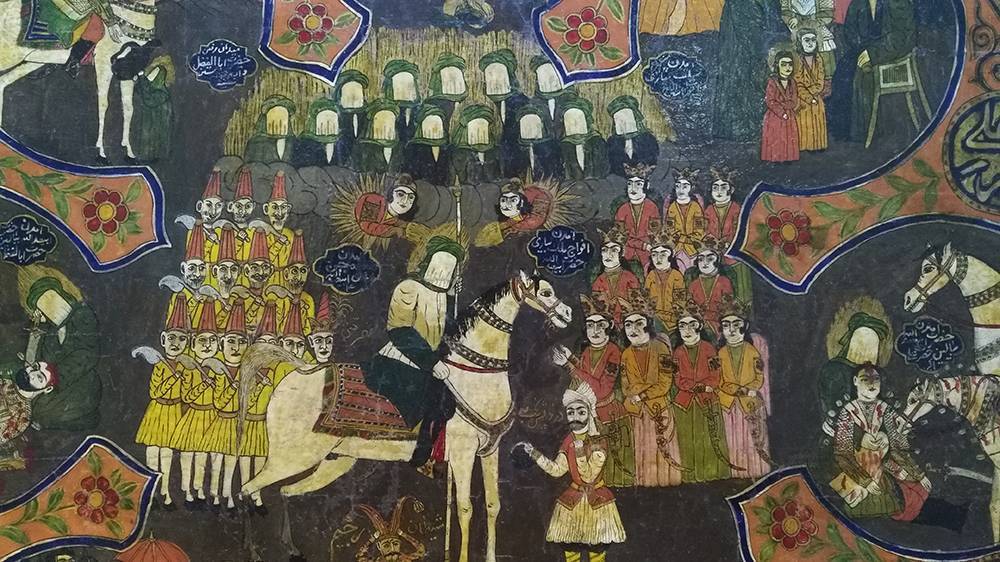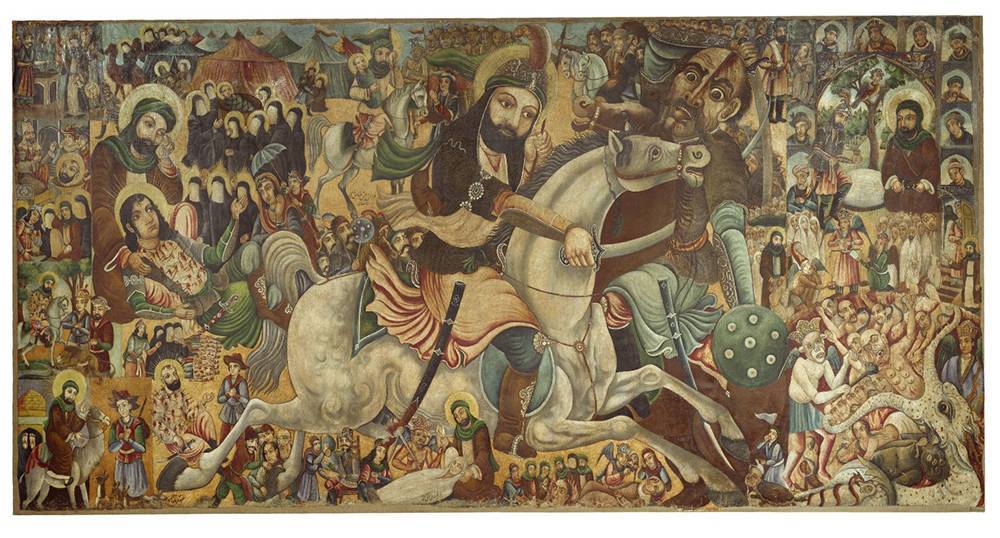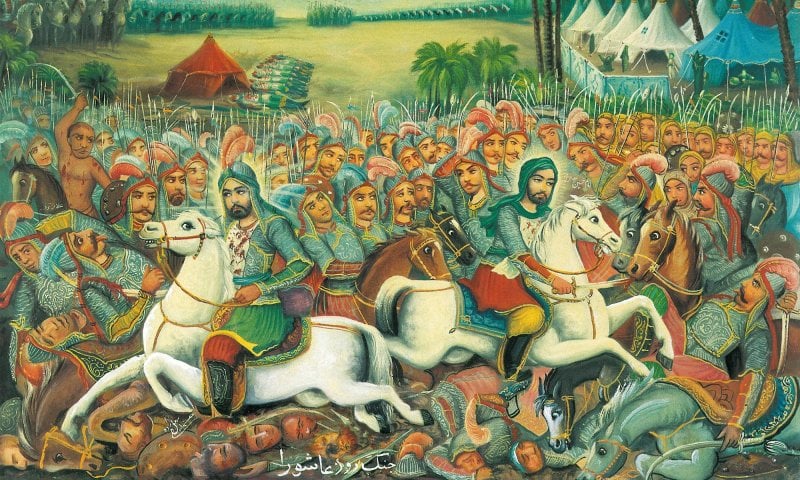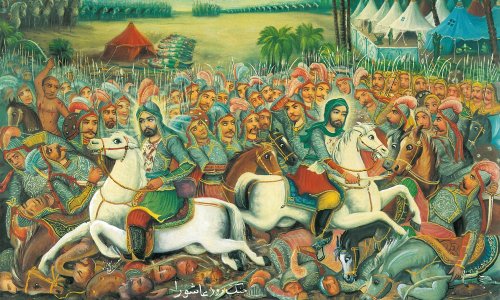Unlike his father, who enjoys an important and distinguished position in the collective Sunni mind, since he is a “Sahabi”, a companion of the prophet, there has been a great deal of conflict between Sunni scholars regarding the character of the second Umayyad caliph Yazid the son of Muawiya.
Yazid, who ruled for only three years is associated with a series of bloody events, a gory chapter in Islamic history, the most important being the massacre of the grandson of the Prophet, Hussein bin Ali bin Abi Talib along with part of his family in Karbala in 61AH.
Despite the catastrophic impact of this event on the history of Islam, many Sunni scholars and thinkers have scrambled to find justifications and excuses for Yazid in an attempt to exonerate & distance him from this incident while other Sunni scholars consider him degraded and have vilified and & execrated him.
Between the two camps, the most popular Sunni stance towards Yazid is that of neutrality Taqi al-Din Ibn Taymiyyah summarized this position in his book “The Complete Collection of Fatwas” “Yazid among the scholars of Islam is a king among kings They do not love him in the way they do the saints and the righteous and the right thing to do is what the Imams do, not to delve into love nor to vilify”.
From Truce to Karbala
In 41 AH (661 AD), the civil war between the Muslims ended, and a truce was brokered between Hassan bin Ali and the people of Iraq on the one hand, and Muawiya bin Abi Sufyan and the people of Syria on the other hand and it was agreed that Muawiya was to become the Caliph, establishing the Umayyad Caliphate.
Despite the conflicting statements regarding the terms and conditions of the peace treaty most historical sources (like the Kitab al Tabaqat al Kubra of Ibn Sa’d) recount that the agreement stipulated that the succession would be determined after the death of Muawiya through Shura (consultation) among the Muslims without any interference from the first Umayyad caliph.
In 50 AH / 670 AD, Al-Hasan ibn Ali, the most fortunate in the line of succession died. This allowed Mu'awiya to circumvent the terms of the peace treaty he had already agreed to. After listening to advice from some of his followers and supporters he appointed his son Yazid as his heir and sent word to the Muslim settlements to receive their oath of allegiance (bay’ah).
Ibn Katheer al-Dimashqi explains Mu'awiya's move in his book "The Beginning and the End" by saying: "He believed him to have worldly brilliance, the knowledge of warfare of the sons of kings, and thought that no other man is better to be the Caliph”.
Despite the opposition of a group of companions of the prophet such as Hussein bin Ali and Abdullah bin Zubair, but they were forced to remain silent after they were threatened with death, according to the "History of the Prophets and Kings" of Ibn Jarir al-Tabari.
In 60 AH / 679 AD, with the death of Muawiya ibn Abi Sufyan, these differences erupted, and appeared on the political scene, after Yazid demanded that his opponents pledge allegiance to him. Al Hussein and Ibn al-Zubayr refused and left Madina heading for Mecca away from the powerful grip of the Umayyads.
Yazid, who ruled for only three years is associated with a series of bloody events, a gory chapter in Islamic history, the most important being the massacre of the grandson of the Prophet, Hussein bin Ali bin Abi Talib
The killing of Al-Hussein, the prophet’s grandson, at the hand of Umayyad Caliph Yazid remains fertile ground for the Sunni-Shiite rift, which possibly started the day the prophet died for many Islam scholars.
At the end of the year, Hussein bin Ali decided to travel to Al Kufa, after receiving dozens of pledges from his supporters (the Shiites) promising him victory and support and to revolt against Yazid.

Events escalated and reached a climax on the tenth of Muharram in 61 AH, in the region of Karbala in Iraq, when the Umayyad army intercepted the path of Hussein and his family and friends, a battle broke out between the two parties, in which the grandson of the Prophet drowned in his blood after the Kufis failed him.
From Ghazali to Ibn Khaldun ... Finding Excuses for Yazid
Abu Hamed al-Ghazali (d. 505 AH) was one of the earliest Sunni scholars to defend Yazid ibn Mu'awiyah. Perhaps he took this position, driven by his pro-ruling regime tendencies as al-Ghazali was closely affiliated with the Seljuk sultans and Abbasid caliphs. The ruler must do what is necessary to defend his rule, in order to prevent the sedition and chaos that will occur in the country if there is disagreement about who is to be the ruler.
In his book "Revival of the Science of Religion", Ghazali denies the possibility that Yazid should be held accountable for the death of Al Hussein. "It is true that Yazid ibn Mu'awiyah is correct and that the killing of Al Hussein was not ordered by him or with his consent and he was not present when he was killed. And since suspecting a Muslim of ill deeds is “haram” as Allah said “O ye who believe! Avoid suspicion as much (as possible): for suspicion in some cases is a sin”.
Ghazali questioned the historical accounts that linked Yazid to the tragedy of Karbala. He said: "Whoever claims that Yazid ordered the killing of Hussein or was pleased with it, he should know that it is very foolish, If the elders, ministers, and sultans had wanted to know the truth of who ordered his killing, who was pleased with it and who hated him, they could not do so. This incident has roused passions and there has been much talk from both sides about it so there is no way to know the truth and since it is the duty of every Muslim not to be suspicious then we must think well of him.
Similarly, the jurist and the Andalusian judge Abu Bakr ibn al-Arabi al-Maliki (d. 543 AH), who is one of the Sunni scholars who worked to provide justifications and excuses for the killing of Al Hussein in his books “The capitals and the divisions, and investigation of the positions of the companions of the prophet after his passing.”
Ibn al-'Arabi carries the burden of defending the history of the Umayyad state in general, especially with regard to the massacre of Karbala.He builds his defence of Yazid on two important grounds. First, Hussein was wrong in going against Yazid since he was the Wali (ruler) presumably which means he should have obeyed him and says that Hussein "did not accept the advice of the most knowledgeable people of his time and wanted to begin things by ending them and demanded uprightness from the corrupt and youthful vigour from the elderly. He did not have supporters that would protect his right or those who would exert effort on his behalf”.
The second grounds is that Yazid and his soldiers killed Al Hussein in deference to orders transmitted from the Holy Prophet, which permits the killing of the rebel who goes against the tribe. “No-one did anything save through interpretation and what they had heard from his grandfather, who is supreme among prophets so he was hesitant to enter into fitnah (unrest) and his sayings regarding this are many, including what Muslim told from what he heard from Ziad that whoever wanted to divide the nation, strike them with the sword regardless of who they are, that is the only way to be with the people, to be of this ilk”
From here, many historians, including Abdul Rahman bin Khaldun in his introduction, quoted Ibn al-Arabi al-Maliki, saying: "Hussein was killed by the sword of his grandfather, or the law of his grandfather," and that quote became very famous and spread although it is not explicitly mentioned in Ibn al-Arabi’s book although it complements all his views and beliefs.
Many Sunni scholars learned the views of al-Ghazali and Ibn al-Arabi, and echoed and added to them, and codified them in their works, the most famous of them is Abu Amr Othman al-Shahrzuri, known as Ibn al-Salah (643 AH) when he stated in his fatwas that "it is not true that he ordered (Al Hussain’s) killing and as is known to order his killing leads to his killing. But it was Abeid Allah Ben Zeyad the Wali of Kufa then. But to insult and curse him is not becoming of the faithful.
In the eighth century (AH) the question of Yazid's rule and his relationship to the murder of Hussein was raised again. After acknowledging that Yazid had committed a crime Shaykh al-Islam Ibn Taymiyyah chose to take a middle position in this matter. He exonerated the second Ummayad Caliph of killing Al Hussain but admitted that he was tyrannical and that there were other companions of the prophet who were more deserving of becoming Caliph and he wrote this in his book “The methods of the Sunna of the prophet in responding to the Shiaa and Al Qadariya” and this in response to Twelver Shia Islam.
Ibn Taymiyah states in his book: Yazid bin Muawiya did not order the killing of Hussein by agreement of the people of Naql but wrote to Ibn Ziad to ask him to prevent him from becoming Wali of Iraq”.
Ibn Taymiyyah also elaborated on Yazid's sorrow and distress from what happened to the tribe of the Prophet and criticized all historical accounts that spoke of how the Umayyad Caliph insulted the Prophet's family. “When Yazid was informed of the killing of Al Hussain, he looked in pain and began to weep at home, he never insulted the women of the house of the prophet but rather honoured them and returned them to their countries, but as for these stories in the books of the Shiaa that he insulted the women of the house the prophet and took them to Al-Sham to be concubines, this is all false. The Umayyads honoured the Hashemites”.
While most Sunni scholars who sought excuses for Yazid based their arguments on Sharia or Islamic jurisprudence the Andalusian historian Abd al-Rahman ibn Khaldun disagreed with them and based his argument on the role of volatility and anger and its strong ties to the foundation of nations, political systems and ruling.

In his famous “Introduction”, specifically in the chapter on succession, Ibn Khaldun says: "As for Hussein, when he appeared Yazid was diminished in the eyes of all of the people of his time. The Shiite Ahl al-Bayt in Al Kufa summoned Al Hussein to come so they could be under his command. Al Hussein saw that that rebelling against Yazid was necessary because of his corruption “.
The meaning of Ibn Khaldun's article is that Al Hussein erred in going on his campaign because he did not take into account the reasons for the availability of forces, and because he ignored the Sunnis regarding the volatility of Bani Umayyah beyond the rest of the Arab tribes, which means that Yazid’s succession was, in fact, a fait accompli there was no way to change or exchange it with another, it was inevitable and imposed by the dynamic forces of history.
Ibn Khaldun's sees Hussein’s mistake as clear saying that "Al Hussein's mistake becomes clear to us but it was in a worldly matter, it would not harm to make a mistake in that, but legitimate rule he should not have made a mistake regarding that because it is contingent on his understanding and his understanding that he was capable of it.”
Ibn al-Jawzi, Shokani and al-Alusi: Cursing Yazid
In parallel with the Sunni line, which was looking for any justification or excuse to remove the charge of killing Hussein, there was another group of scholars who believed that Yazid had committed a crime and many even cursed and described him as an apostate in their writings.
One of the most famous of these scholars was Jamal al-Din 'Abd al-Rahman ibn al-Jawzi al-Hanbali (d. 597 AH), who compiled a complete book on the subject called "The Response to the Stubborn Fanatic who Prevents the Maligning of Yazid.”
Ibn al-Jawzi responded in this book to one of the famous Hanbal scholars of his time, Abdul Mughith al-Baghdadi, who had written a book calling for the prohibition of insulting and cursing Yazid.
Shams al-Din al-Dhahabi, in his book "Biographies of the nobles", refers to the political dimension of the issue in that era, as the Abbasid caliph al-Nasser “When Nuhey Abd Al Mugheth informed him about the cursing of Yazid, he disguised himself and went to him and enquired about it and so he answered “I meant to stop wagging tongues from cursing the Caliphs because if we allowed it then the Caliph of the time would be more worthy of being cursed because he does this and that and then began to list his faults.”
Hence, it is possible to understand the hidden meanings of Ibn al-Jawzi's book, and how he attempted to eradicate the untouchability of the Caliphs and the sultans of the time.
Also, in the same context, some of the leading Sunni scholars directed the sharp arrows of their criticism at scholars who sought excuses to justify the killing of Hussein, like Yemen Badr al-Din al-Shawkani (d. 1250 AH), in his famous book "Nayl Al Awtar ", He said: "Some scholars like Karamieh and those who are like them in mulishness have passed judgement on Al Hussein as a lascivious, drunken betrayer of the pure Shariaa of Yazid, the curse of God be upon them! They are a wonder their articles which make the skin creep and the most flinty head ring “
Shihab al-Din al-Alusi (d. 1270 AH), in his book of Tafseer (exegesis) posited that it was permissible to curse Yazid using as proof a number of hadith which permit the cursing of the wayward “do not stop in the cursing of Yazid due to his numerous devious traits and his committing of the great sins on every day of his caliphate and his biggest sin was what he did to those of the house of the Prophet and his consenting to the killing of Al Hussein and his insulting of his family.”
Among the great scholars who also insulted Yazid in their writings are: the Jurist Abi Yaali al Faraa in the fifth century Saad al-Din Taftazani in the eighth century, and Jalal Aldin al Suyooti in the 9th century (AH).
Raseef22 is a not for profit entity. Our focus is on quality journalism. Every contribution to the NasRaseef membership goes directly towards journalism production. We stand independent, not accepting corporate sponsorships, sponsored content or political funding.
Support our mission to keep Raseef22 available to all readers by clicking here!
Interested in writing with us? Check our pitch process here!






